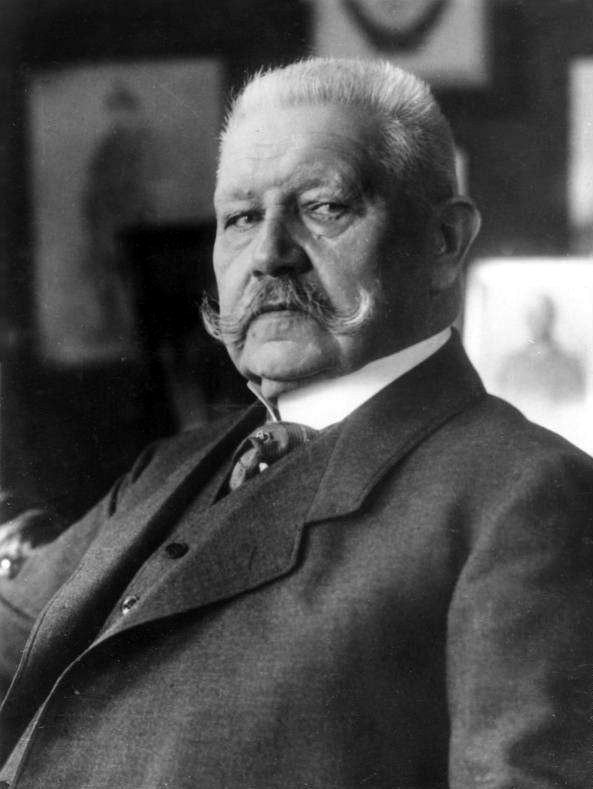Paul von Hindenburg

Quote: "I was never able to understand how it was that here and there the welfare of the Fatherland had to be sacrificed to mere petty party interests, and from the point of view of political conviction felt myself most at home in the shade of that tree which was firmly rooted in the ethico-political soil of the epoch of our great and venerable Emperor. That epoch, with what I regarded as its wonderful glories, seemed to have become part of me, and I adhered firmly to its ideals and principles. The course of events in the present war have hardly been of a kind to make me particularly enthusiastic about the developments of later times. A powerful, self-contained State in Bismarck's sense was the world in which I preferred my thoughts to move. Discipline and hard work within the Fatherland seemed to me better than cosmopolitan imaginings. Moreover, I fail to see that any citizen has rights on whom equal duties are not imposed." -- Out of My Life (London: Cassell, 1920), pp. 236-237.
Sobriquet:
Appearance:
Behavior: "…withdrawing his solemn constitutional oaths of 1925 and 1932 to make common cause with the sworn enemies of the Republic. And then, having publicly declared that he would never consent to appoint Hitler to any post…levered the Nazi leader into the German Chancellery in January 1933. The Field Marshal had a high opinion of himself, and he doubtless sincerely believed that he personified a Prussian ‘tradition" of selfless service. But he was not, in truth, a man of tradition…As a military commander and later as Germany's head of state, Hindenburg broke virtually every bond he entered into. He was not the man of dogged, faithful service, but the man of image, manipulation and betrayal." -- Criticism of Hindenburg in his role as head of state by Historian Christopher Clark
History: Paul Ludwig Hans Anton von Beneckendorff und von Hindenburg, known generally as Paul von Hindenburg was born on 2 October 1847 and died on 2 August 1934. He was a German military officer, statesman, and politician who served as the second President of Germany from 1925–34.
Hindenburg retired from the army for the first time in 1911, but was recalled shortly after the outbreak of World War I in 1914. He first came to national attention at the age of 66 as the victor of the decisive Battle of Tannenberg in August 1914. As Germany's Chief of the General Staff from August 1916, Hindenburg's reputation rose greatly in German public esteem. He and his deputy Erich Ludendorff then led Germany in a de facto military dictatorship throughout the remainder of the war, marginalizing German Emperor Wilhelm II as well as the German Reichstag. In line with Lebensraum ideology, he advocated sweeping annexations of territory in Poland, Ukraine, and Russia in order to resettle Germans there.
Hindenburg retired again in 1919, but returned to public life in 1925 to be elected the second President of Germany.
Recent Events: In 1932, Hindenburg was persuaded to run for re-election as German president, although 84 years old and in poor health, as he was considered the only candidate who could defeat Adolf Hitler. Hindenburg was re-elected in a runoff. He was opposed to Hitler and was a major player in the increasing political instability in the Weimar Republic that ended with Hitler's rise to power. He dissolved the Reichstag (parliament) twice in 1932 and finally, under pressure, agreed to appoint Hitler Chancellor of Germany in January 1933.
Events Soon to Occur: In February, he signed off on the Reichstag Fire Decree, which suspended various civil liberties, and in March he signed the Enabling Act of 1933, which gave Hitler's regime arbitrary powers.
Should the Time-line Remain Stable: Hindenburg died the following year, after which Hitler declared the office of President vacant and made himself head of state.